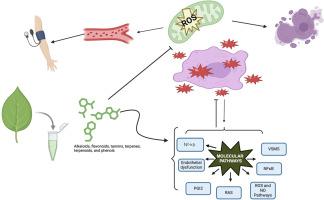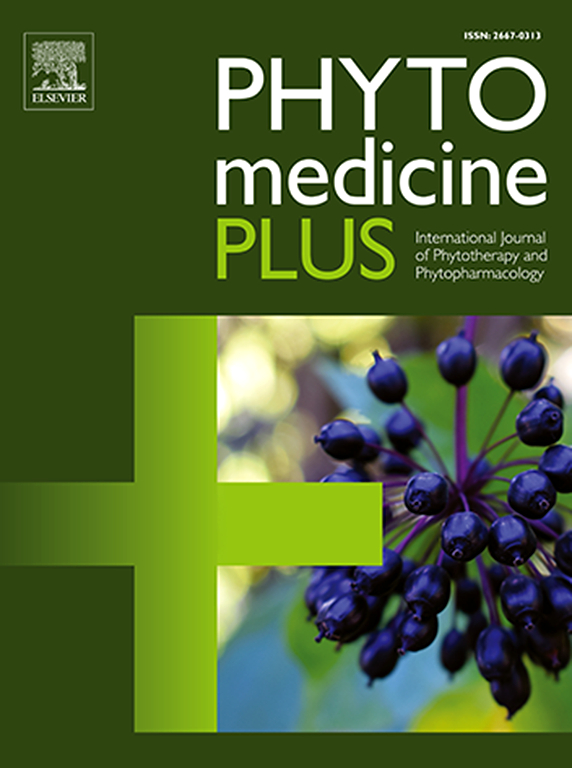植物化合物减轻高血压的分子机制
Q3 Pharmacology, Toxicology and Pharmaceutics
引用次数: 0
摘要
背景高血压是世界范围内心血管疾病和死亡的主要危险因素,特别是在低收入和中等收入国家。虽然存在传统的抗高血压疗法,但其副作用和成本限制了可及性,促使人们探索更安全的植物性替代品。目的本文旨在通过阐明植物化学物质在多种分子通路中的作用机制,全面探讨植物化学物质在高血压治疗中的治疗潜力。方法采用PubMed®、谷歌Scholar、ScienceDirect®、Scopus等数据库进行综合文献综述。分析的重点是影响血管平滑肌细胞(VSMCs)、氧化应激(ROS/NO)、肾素-血管紧张素系统(RAS)、NF-κB信号传导、内皮功能障碍和前列环素(PGI₂)通路的植物化学物质。结果许多植物化学物质,包括槲皮素、白藜芦醇、芹菜素和熊果酸,通过靶向涉及血管重构、炎症和氧化应激的关键信号级联显示出抗高血压作用。新出现的证据支持纳米技术在提高其生物利用度和治疗效果方面的作用。然而,在生物利用度、标准化、临床验证和潜在的药物相互作用方面仍然存在挑战。结论植物化学药物对高血压的治疗具有多靶向性和可持续性。未来的研究应优先考虑临床试验、药代动力学、个性化方法和先进的给药系统,将临床前研究结果转化为临床实践,改善高血压人群的预后。本文章由计算机程序翻译,如有差异,请以英文原文为准。

Molecular mechanism of phytochemical compounds in mitigating hypertension
Background
Hypertension is a leading risk factor for cardiovascular diseases and mortality worldwide, particularly in low- and middle-income countries. While conventional antihypertensive therapies exist, their adverse effects and cost limit accessibility, prompting the exploration of safer, plant-based alternatives.
Purpose
This review aims to comprehensively examine the therapeutic potential of phytochemicals in the management of hypertension by elucidating their mechanisms of action across multiple molecular pathways.
Method
A comprehensive literature review was conducted using databases including PubMed®, Google Scholar, ScienceDirect®, and Scopus. The analysis focused on phytochemicals affecting vascular smooth muscle cells (VSMCs), oxidative stress (ROS/NO), the renin–angiotensin system (RAS), NF-κB signaling, endothelial dysfunction, and prostacyclin (PGI₂) pathways.
Results
Numerous phytochemicals, including quercetin, resveratrol, apigenin, and ursolic acid, demonstrate antihypertensive effects by targeting key signaling cascades involved in vascular remodeling, inflammation, and oxidative stress. Emerging evidence supports the role of nanotechnology in enhancing their bioavailability and therapeutic efficacy. However, challenges remain regarding bioavailability, standardization, clinical validation, and potential drug interactions.
Conclusion
Phytochemicals offer a multi-targeted and sustainable strategy for hypertension management. Future research should prioritize clinical trials, pharmacokinetics, personalized approaches, and advanced delivery systems to translate preclinical findings into clinical practice and improve outcomes in hypertensive populations.
求助全文
通过发布文献求助,成功后即可免费获取论文全文。
去求助
来源期刊

Phytomedicine Plus
Medicine-Complementary and Alternative Medicine
CiteScore
3.70
自引率
0.00%
发文量
178
审稿时长
81 days
期刊介绍:
 求助内容:
求助内容: 应助结果提醒方式:
应助结果提醒方式:


